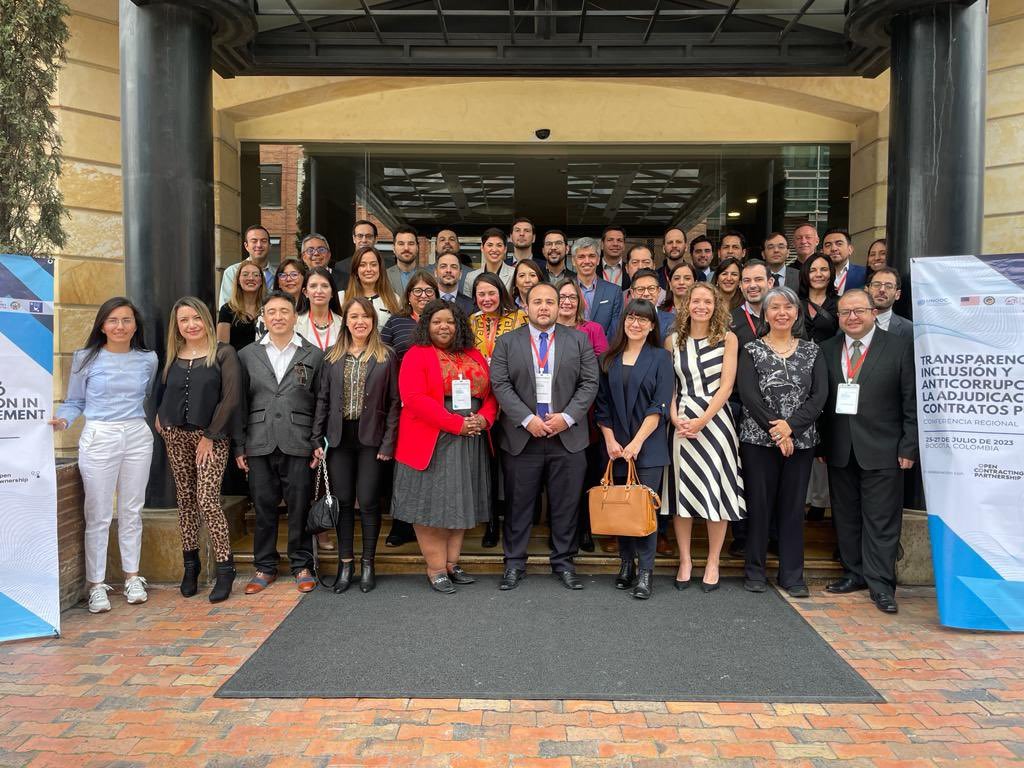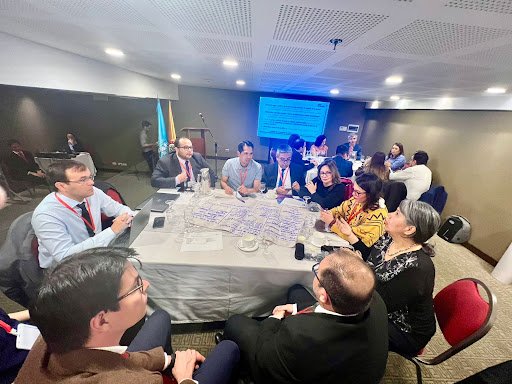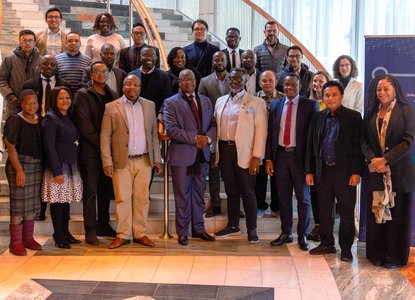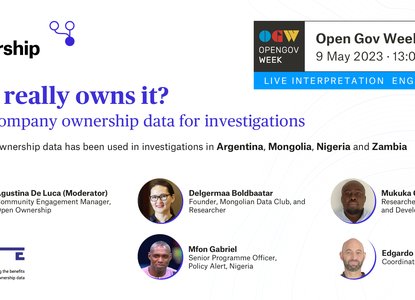Fighting corruption in public procurement with beneficial ownership data in Latin America

Participants from across the LAC region at the conference in Bogota, Colombia, in July 2023
Public procurement is a huge part of Latin American and Caribbean (LAC) countries’ economies. It represents an average of 8.6% of their total gross domestic product (GDP) and about 30% of government expenditures. Unfortunately, it also accounts for a large amount of corruption, as it’s a sector open to mismanagement. There is a lack of traceability of resources, and conflicts of interest which can obscure the good intentions behind a government contract to, for example, repair roads or deliver healthcare. Transparency International reported in March 2020 that "thirteen of our national chapters from across Latin America raised alarm over serious corruption risks in the region’s emergency response to the coronavirus or COVID-19 pandemic, and specifically, the public procurement process."
Representatives from public procurement agencies, anti-corruption authorities and prosecuting offices from eight Latin American countries met recently in Bogota, Colombia, to discuss how to promote integrity in their national procurement processes, and fight corruption in this vital but complex arena. During the last week of July 2023, Open Ownership joined the United Nations Office on Drugs and Crime (UNODC), and the Open Contracting Partnership (OCP), at the UNODC regional conference on anti-corruption and integrity in public procurement processes.
After three days of peer exchange, we can confidently say that beneficial ownership transparency (BOT) is a key asset to achieve the region’s objectives for greater transparency in public procurement.
Beneficial ownership transparency in Latin America
BOT is a nascent but growing area of reform in the region. Its implementation has been driven by compliance with the Financial Action Task Force (FATF) standards, and Requirement 2.5 of the Extractive Industries Transparency Initiative (EITI)’s standard. Additionally, Resolution 9/7 of the Conference of the States Parties to the United Nations Convention against Corruption adopted in December 2021, called upon member States to ensure the collection and efficient access to up-to-date beneficial ownership information to competent authorities, including those in charge of public procurement. A few countries have also committed to advancing BOT through their national action plans under the Open Government Partnership.
Countries like Argentina, Colombia and Ecuador have implemented (or are about to implement) central BO registries which sit under their tax authorities’ responsibility. Other countries such as Paraguay have created a central registry under the Legal Persons Directorate of the Ministry of Finance, with layered access to competent authorities and the general public. Meanwhile in Chile, the government is about to ratify a new law improving the public procurement system, which will include the need to collect and use BO data for due diligence processes.
Peer learning and training
The conference enabled stakeholders to share their experiences and concerns. OO, UNODC and OCP gave specific details on what’s needed to collect and use BO data for public procurement accountability. Participants learned about global trends and key aspects of BOT implementation, and during one training exercise, learnt how to identify the true owners in complex ownership chains.

Group work where participants mapped BO progress in their country, and the key data fields needed for transparent public procurement
Primarily, however, the representatives of all eight countries explored concrete use cases of BO analysis within public procurement, such as fighting corruption and fraud, improving service delivery and promoting preferential procurement for minorities, Small and Medium Enterprises (SMEs) or for defence purposes.
Argentina, Colombia and Chile already implement preferential procurement practices for women-led enterprises. Colombia and Paraguay, in turn, are developing preferential policies for local entrepreneurs and SMEs respectively, in order to promote the domestic market.
However, these efforts just reach the legal ownership level, rather than the ultimate beneficial owners. The availability of robust, full-sector BO data would help make a huge step forward, and enable varied actors to assess if women or local producers are truly in control of the company bidding for a contract.
Access to adequate and accurate beneficial ownership data
Workshop participants discussed some of the challenges of accessing BO data within the public procurement process. Discussions underscored the importance of BO data being made available to the right actors in order to tackle corruption and organised crime in the region. In some instances, the lack of publicly-available BO data was identified as a barrier for procurement and anti-corruption authorities’ ability to undertake investigations. In such cases, knowing the ownership and control of a corporate vehicle is crucial.
Discussions on how to safeguard privacy rights and mitigate security risks, while enabling the use and publication BO data for procurement processes, were insightful. Delegates discussed policy options, including the use of layered access to data, and determining which actors have legitimate interest to access and use BO data. Others participants highlighted the importance of a robust legal framework for BO disclosures as an essential tool for unlocking the use of BO data to fight corruption.
Resolution 9/7 of the Conference of State Parties to the United Nations Convention against Corruption calls for efficient, adequate and accurate access to BO data for law enforcement and competent authorities. Revisions to the FATF requirements now also task countries to ensure that public authorities have access to BO information of legal persons in the course of public procurement. These resolutions and requirements point to the importance of the right level of access to BO data and the growing global momentum which supports its use in public procurement.
Using beneficial ownership data for public procurement
The workshop was immensely useful in laying the foundations for the use of BO data as a tool to tackle corruption and improve integrity in public procurement processes in the region. We identified clear pathways towards implementation of BO data-use in public procurement processes through the presentations which closed knowledge gaps, rich policy discussions, and practical exercises. Open Ownership will continue to engage with UNODC, OCP and all relevant authorities from LAC countries on this critical topic, in order to advance BO reforms that bring tangible benefits to citizens.
Related articles and publications
Publication type
Blog post
Country focus
Chile,
Paraguay,
Argentina,
Colombia,
Ecuador
Topics
Procurement
Sections
Implementation


